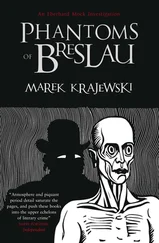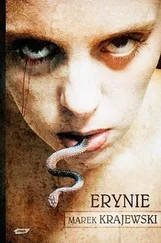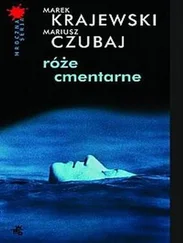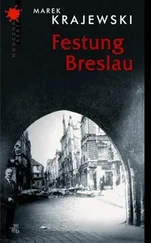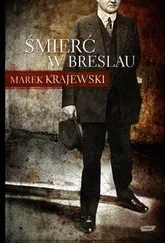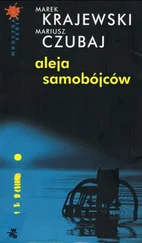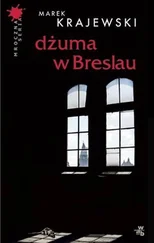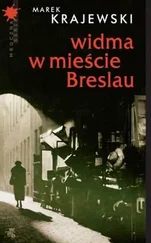Marek Krajewski - Death in Breslau
Здесь есть возможность читать онлайн «Marek Krajewski - Death in Breslau» весь текст электронной книги совершенно бесплатно (целиком полную версию без сокращений). В некоторых случаях можно слушать аудио, скачать через торрент в формате fb2 и присутствует краткое содержание. Жанр: Полицейский детектив, на английском языке. Описание произведения, (предисловие) а так же отзывы посетителей доступны на портале библиотеки ЛибКат.
- Название:Death in Breslau
- Автор:
- Жанр:
- Год:неизвестен
- ISBN:нет данных
- Рейтинг книги:3 / 5. Голосов: 1
-
Избранное:Добавить в избранное
- Отзывы:
-
Ваша оценка:
- 60
- 1
- 2
- 3
- 4
- 5
Death in Breslau: краткое содержание, описание и аннотация
Предлагаем к чтению аннотацию, описание, краткое содержание или предисловие (зависит от того, что написал сам автор книги «Death in Breslau»). Если вы не нашли необходимую информацию о книге — напишите в комментариях, мы постараемся отыскать её.
Death in Breslau — читать онлайн бесплатно полную книгу (весь текст) целиком
Ниже представлен текст книги, разбитый по страницам. Система сохранения места последней прочитанной страницы, позволяет с удобством читать онлайн бесплатно книгу «Death in Breslau», без необходимости каждый раз заново искать на чём Вы остановились. Поставьте закладку, и сможете в любой момент перейти на страницу, на которой закончили чтение.
Интервал:
Закладка:
Anwaldt glanced at the wrist on which he wore a watch. The watch was no longer there. Oh yes, yesterday, overcome with pity, he had offered it to a beggar. A persistent thought stung him: how to get out of the place. This was not going to be easy. He could not see his clothes anywhere. Although he had no shortage of extravagant ideas, he was not wont to go out into the street wearing nothing but his underpants. He noted with relief that, true to a habit which he had acquired at the orphanage, he had tied his shoes together and hung them around his neck.
He picked himself up from the bed and almost fell. His legs slid apart on the wet floor, his arms waved about frantically and found support: the left on a child’s metal bed, the right on a stool where someone had spilt the contents of an ashtray.
Hammers continued to bang within his head, his lungs pumped fiercely, his throat emitted a rasping sound. Anwaldt struggled with himself for a moment — he wanted to lie beside the drunken nymph, but when he looked at her and smelt the odour of rotten teeth and putrid gums, he put the idea firmly aside. In the corner, he espied his creased suit. As swiftly as he could, he dressed in the darkness of the stairwell, dragged himself out into the street and remembered its name: Weserstrasse. He did not know how he had got there. He whistled at a passing droschka †. Criminal Assistant Herbert Anwaldt had been drinking for what was already the fifth day. With short intervals, he had been drinking for six months.
BERLIN, THURSDAY, JULY 5TH, 1934
EIGHT O’CLOCK IN THE MORNING
Criminal Commissioner Heinrich von Grappersdorff was exploding with rage. He thumped the table with his fist and screamed blue murder. It seemed to Anwaldt that the snow-white, round collar of his superior’s shirt would snap over the distended, bull-like neck. He was not especially perturbed by the screaming. Firstly, because any thoughts getting through to his mind were muffled by the thick filter of a hangover; secondly, because he knew that the “old ox from Stettin” had not fallen into a genuine fury yet.
“Look at yourself, Anwaldt.” Von Grapperdorff grasped the Assistant under the armpits and stood him in front of a mirror mounted in an engraved frame. The gesture gave Anwaldt pleasure, as if it were a coarse masculine caress. He saw, in his reflection, the slim, unshaven face of an auburn-haired man which undeniably betrayed the five-day binge. The whites of his eyes, shot with blood, were lost in their swollen sockets, from the dry lips stuck out flakes of sharp skin, the hair clung to a deeply furrowed brow.
Von Grappersdorff took his hands from Anwaldt and wiped them with revulsion. He stood behind his desk and once more assumed the stance of Thunderer.
“You’re thirty and look as if you were forty. You’ve sunk to the very bottom like the worst whore! And all because of some rag with the face of an innocent. Soon any Berlin thug will buy you out for a tankard of beer! And I don’t want any corruptible whores here!” He drew in a breath and roared: “I’m throwing you out, Schnappswald! Reason: five days’ unauthorised leave.”
The Commissioner sat down behind his desk and lit a cigar. Blowing clouds of smoke, he did not take his eyes off what used to be his best employee. The filter of a hangover had stopped working. Anwaldt realized that he would soon be left without a pension and would only be able to dream of alcohol. This thought had the necessary effect. He looked pleadingly at his superior, who suddenly started reading a report from the previous day. After a long while, he sternly said:
“I am dismissing you from the Berlin police. As of tomorrow, you start work at the Breslau Police Praesidium. A certain very important person there wants to entrust you with a rather difficult mission. So? Do you accept my proposition or are you going to beg on Kurfurstendamm? If the local boys let you in on a cushy job …”
Anwaldt tried not to burst into tears. He did not think about the Commissioner’s proposition so much as about holding back his tears. This time von Grappersdorff’s fury was genuine.
“Are you going to Breslau or aren’t you, you wine-sodden tramp?”
Anwaldt nodded. The Commissioner calmed down immediately.
“We’ll meet on Friedrichstrasse this evening at eight, on platform three. I’ll give you a few essential details then. Here are fifty marks to clean yourself up. Pay me back when you’re settled in Breslau.”
BERLIN, THAT SAME JULY 5TH, 1934
EIGHT O’CLOCK IN THE EVENING
Anwaldt arrived punctually. He was clean, shaven and — most importantly — sober. He was dressed in a new, lightweight, pale-beige suit and matching tie. He carried a tattered briefcase and an umbrella. His hat, somewhat askew, made him look like an American actor whose name von Grappersdorff did not know.
“Well. Now, that’s more like it.” The Commissioner approached his former employee and sniffed. “Breathe out!”
Anwaldt did as he was told.
“Not a single beer?” Von Grappersdorff was incredulous.
“Not even a beer.”
The Commissioner took him by the arm and they began to walk along the platform. The engine was expelling clouds of steam.
“Listen carefully. I don’t know what it is you’ve got to do in Breslau, but the task is very difficult and dangerous. The bonus you’ll receive will allow you not to work for the rest of your life. Then you’ll be able to drink yourself to death, but during your stay in Breslau, not a drop … Understood?” Von Grappersdorff laughed heartily. “I must admit, I advised Muhlhaus, my old friend from Breslau, against this. But he insisted. I don’t know why. Maybe he heard that you used to be good from somewhere. But, to the point. You’ve got the entire carriage to yourself. Have a good time. And here’s a going-away present from your colleagues. It’ll help with the hangover.”
He wagged his finger. A shapely brown-haired woman in a playful hat came up to them. She handed Anwaldt a piece of paper: “I’m a present from your colleagues. Take care and drop in to Berlin again from time to time.”
Anwaldt looked around and behind the ice-cream and lemonade stall on the platform he saw his laughing colleagues pulling silly faces and making rude gestures. He was embarrassed. The girl, not in the least.
BRESLAU, FRIDAY, JULY 6TH, 1934
HALF-PAST FIVE IN THE AFTERNOON
Criminal Director Eberhard Mock was getting ready to leave for Zoppot, where he intended to spend a two-week holiday. The train was leaving in two hours so it was not surprising that an indescribable mess reigned in his apartment. Mock’s wife felt like a fish in water. The short and corpulent blonde was giving the servants brief instructions in a loud voice. Mock sat in an armchair, bored and listening to the radio. He was in the process of searching for a different wavelength when the telephone rang.
“The Baron von der Malten’s residence here,” he heard the butler Matthias’ voice. “The Baron is expecting you, Criminal Director, just as soon as is possible.”
Without ceasing to search for his wavelength on the radio, the Criminal Director said in a calm voice:
“Listen here, you lackey, if the Baron wants to see me then let him take the trouble ‘just as soon as is possible’ himself because I’m just about to leave on holiday.”
“I was expecting just such a reaction, Eberhard.” Eberhard heard the deep and cold voice of the Baron over the receiver. “I foresaw it and, since I have respect for time, I have placed a visiting card with a telephone number on it next to the receiver. It cost me a lot of trouble to get hold of it. If you don’t come here straight away, I’ll dial the number. Do you want to know who I’ll be connected to?”
Читать дальшеИнтервал:
Закладка:
Похожие книги на «Death in Breslau»
Представляем Вашему вниманию похожие книги на «Death in Breslau» списком для выбора. Мы отобрали схожую по названию и смыслу литературу в надежде предоставить читателям больше вариантов отыскать новые, интересные, ещё непрочитанные произведения.
Обсуждение, отзывы о книге «Death in Breslau» и просто собственные мнения читателей. Оставьте ваши комментарии, напишите, что Вы думаете о произведении, его смысле или главных героях. Укажите что конкретно понравилось, а что нет, и почему Вы так считаете.

